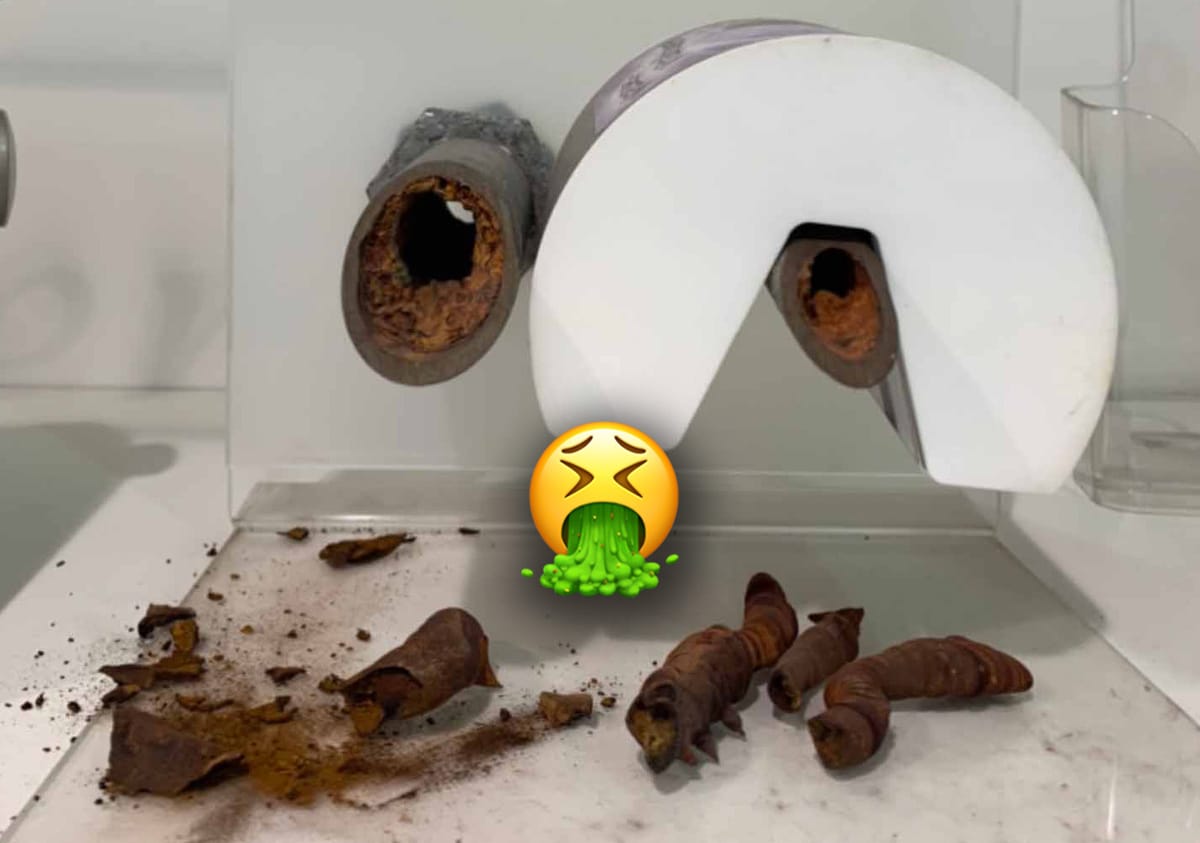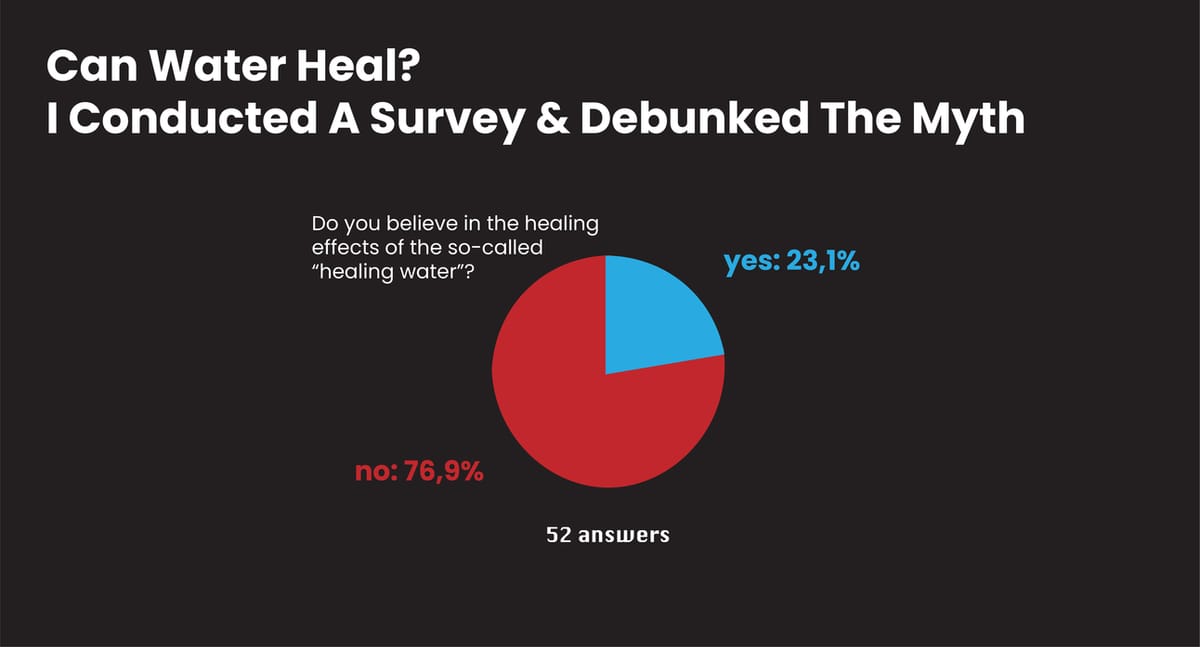“Safe” doesn't equal Good: A Simple Hydration Guide
While tap water is often deemed safe, this does not inherently mean it is beneficial for consumption. Factors such as outdated piping systems and untested contaminants like hormones can compromise the quality of our drinking water.

Is “Safe” Water, Good Water?
Most of us drink water out of the tap.
We ask a local if it is drinkable; and if yes,
we think it’s good.
Most tap waters that are drinkable has been sold to us as “safe”.
It’s convenient, to think that water is such a accessable basic need.
But with that convenience, comes a great drawback. — “safe” does not mean “good”.
But the core way of answering the question; whether or not your drinking water is safe, is by asking “how did this get into my house?”
See, even if we take one of the best of the best…
In the example of the Berliner Urstromtal (which is a big Water well under Berlin), they say it is super clean water.
The tap water is one of the most strictly controlled resources in Germany.
That it is clean, can be the case.
But have a closer look.
Which substances are tested upon in the water quality authority?
— the “Berliner Wasserbetriebe” does not test for hormones (e.g.)


You may think I am nitpicking, but there are several studies on the detremental effects of even small traces of hormones in the water.
“Even small amounts are said to have a major impact on the human body. If the hormonal balance is disturbed by unintentionally ingested hormones in food or drinking water, this can lead to diseases.” — Are Hormones in Tapwater a Problem? (this is a german article)
Then, to logically order the argument in objection:
In order to say if your tap water is clean, the correct question is “when was is clean?”. When has it been freshly filtered? And how does this water get into your house?
It has to be transported to your tap.
Does it go through pipes that are over a 100 years old?
— can be the case

in the example of Berlin, the pipes (especially in older apartements), can easily be 50-100 years old.
Billions of traces of toxic substances get into your system.
“If you are not using a water filter, your body will be the filter.” — unknown
In this Loveletter we will cover the basics of how to properly hydrate with clean drinking water.
Dangers of Dehydration
I am claiming the bold statement that we are chronically dehydrated.
Just by observing the general public; — most people drink 1-2 Liters a day, are more or less active & drink coffee (which demineralizes & thereby dehydrates the body)
Trying to find scientific studies that measured hydration levels of humans, was a bit tricky.
It is said that 75% of the american population is dehydrated.
There is no proper study that proves that we are,
But there is a lot of studies proving the negative effects of dehydration, which are:
- increased risk of kidney stones
- urinary tract infections
- impaired cognitive function
- constipation
- can reduce endurance, decrease strength, and increase fatigue during physical activity.
- increased risk of heat stroke
- kidney damage
- electrolyte imbalances
- dry skin and other skin disorders
- headaches and migraines
- hypotension (low blood pressure)
Let’s Properly Hydrate
Stay Salty
So, how do we properly hydrate then?
First of all, let’s talk about mineralization vs de-mineralization.
You probably experienced this. You chugged 500ml of water into you, and after just 20 minutes you go pee it all out.
That is a strong sign, that your body was not able to absorb the water.
Water stays in your body with the help of salt(minerals)
Salt acts like a magnet for water, so in order to properly absorb water, you need it to have sufficient amount of electrolytes(minerals).
If you have pure water, add a pinch of sea salt or celtic salt.
— this will lead to better absorption.
If you are active enough, you shouldn’t worry about high blood pressure.
If you are worried, have a closer look into your stress levels & coffee intake (trust me).
— salt is not the problem.
Your stress levels are.
Get Some Water That Actually Tastes Good
Most of us drink tap water. It tastes aweful.
But Your body notices everything.
If you read the book “Power vs. Force” by David R. Hawkins , it is states that muscle testing is a great measurement tool for us humans to find out if something is beneficial for us or not.
Building on the accumulated wisdom of applied kinesiology (diagnostic muscle-testing to determine the causes of allergies and ailments) and behavioral kinesiology (muscle-testing to determine emotional responses to stimuli), David R. Hawkins, M.D. has taken muscle-testing to the next level, in an effort to determine what makes people and systems strong, healthy, effective and spiritually sound.
Power vs. Force has become a spiritual classic and massively influential across the world.
Whether or not you believe in muscle testing, does not matter.
Your biology knows more than you can imagine.
Your Subconscious reacts to everything, even if you are not consciously noticing it.
Most of our tap waters are complete garbage for us. Our body rejects it. We, consciously do not even notice it.
But we are not drinking enough. That’s our body saying: “I don’t want to drink this junk.”
Trust me: When your water is good, you do not have to force yourself to drink more.
The problem is, most people have no nuanced taste for water. They think water is tasteless.
This could not be further from the truth, there is worlds of differences.
Learn & train yourself to taste water.
Ditch The Chlorine With Common Sense
„Those people who are forced to drink only sterilized water year in and year out should finally think about how water that has been forcibly deprived of its inherent ability to generate life must affect the organism.“
— Viktor Schauberger, Das Wesen des Wassers
Use common sense here. We drink Water, because it generates life.
Then we add chlorine (which removes the life giving quality of it), and think it is okay to consume it in the long term.
If you want to discuss this with me, please unsubscribe from my e-mail list.
You lack basic common sense, which is required for my content.
The Problem With Flouride
I once had a semi-heated discussion with a cute girl.
She was a petite, red haired, blue eyed & beautiful.
And a Dentist too.
She was doing a permaculture course here on the island. I discussed the dangers of flouride with her, stating that there is several studies out there suggesting its toxicity.
Well, the scientific landscape has not quite yet found common ground.
In the study Developmental Fluoride Neurotoxicity: A Systematic Review and Meta-Analysis, Harvard and China Medical University researchers suggest fluoride might mess with kids’ brains.
They looked at 27 studies, mostly from China where fluoride's a natural in groundwater.
Results?
Kids drinking high-fluoride water scored lower on IQ tests — about a 7-point drop.
More studies are needed, but it's clear: we’ve got to watch how fluoride affects brain development.
Back to the cute woman:
She answered: “But with all things, it’s about the dosage.”
And she was right!
Flouride is a double edged sword. It prevents caries, yes.
Because it is such an aggressive force.
I don’t know if I want such an aggressive force, every day, in my mouth.
Forget the Plastic Bottles
Only use them if you need to.
The Study “Occurrence of microplastics in commercially sold bottled water” found microplastics in bottled water —about 72 pieces per liter in bottled Water. And this is excluding nanoplastics.
Most of these microplastics are tiny bits of cellulose and PVC, mainly in film form, with sizes between 10-50 microns.
Infants drinking this water ingest about twice as many microplastics as adults, even though adults drink more water.
This info is crucial for understanding how microplastics might impact our health.
New research has found plastic in the plaque that build up inside our arteries, which lead to deadly cardiovascular diseases.
In the study “Microplastics and Nanoplastics in Atheromas and Cardiovascular Events” people with microplastics and nanoplastics in their artery plaque had a higher risk of heart attacks, strokes, or death.
Specifically, about 58% had polyethylene in their plaque, and 12% had polyvinyl chloride.
These particles were found inside the plaque and were linked to increased risk of major cardiovascular events.
Bottom line: Having these plastics in your arteries can make you more likely to have serious heart problems.
Conclusion
While tap water is often deemed safe, this does not inherently mean it is beneficial for consumption.
Factors such as outdated piping systems and untested contaminants like hormones can compromise the quality of our drinking water.
As you reflect on the information shared, remember the power lies in informed choices.
By understanding the nuances of water quality and the vital role of hydration, you are bettering a strong basis for a healthy life.
Good Water.
Make hydration a priority.
Kiss Kiss,
Tarkan
Other Related Sources:



